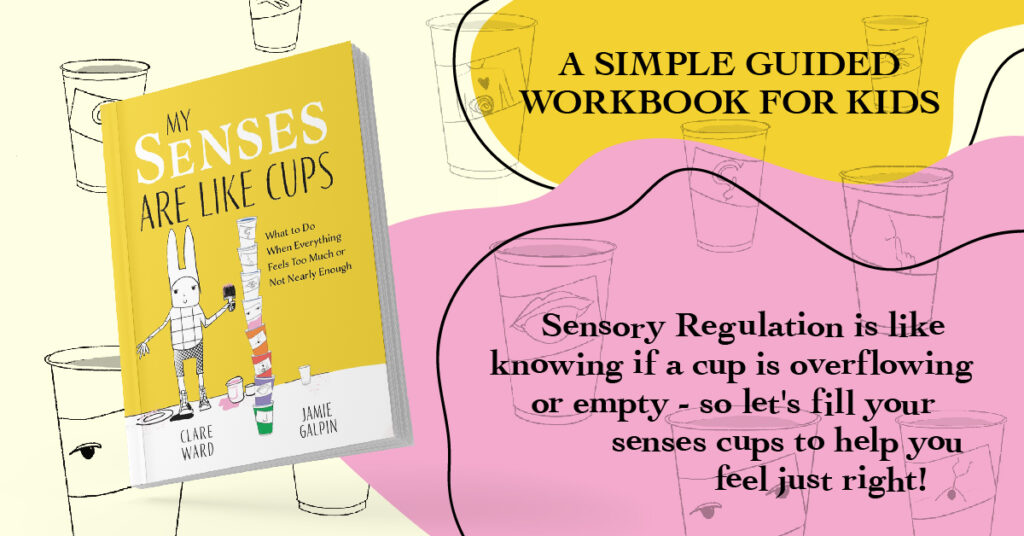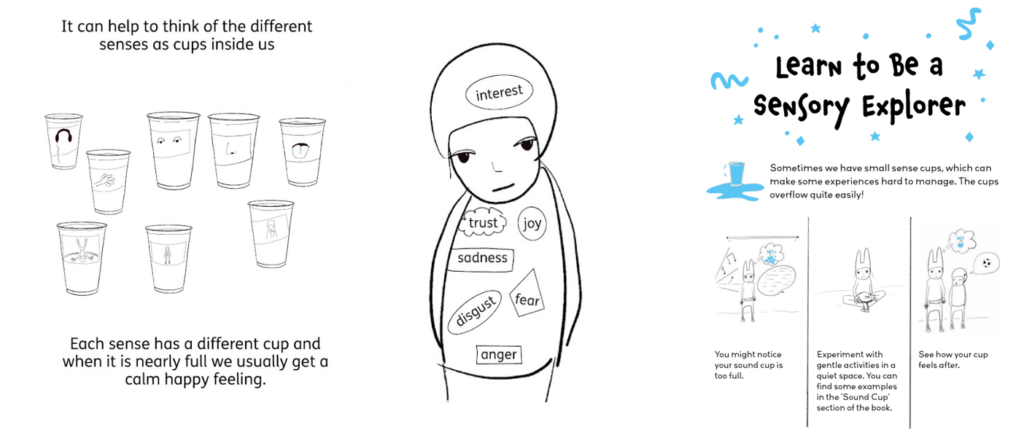Using sensory regulation to help with the transition back to school!
Clare Ward and James Galpin are the authors of ‘My Senses are Like Cups‘, a quirkily illustrated workbook on how playing loud games, fidgeting or even tidying up can help with sensory regulation.

The end of August is a time of transition for lots of people – parents, children, young people and teachers. We move from ‘holiday mode’ where we have more self-direction and predictability in our day (we generally are more in control of what we do and when) to one where we have to follow alarms, timetables, to do lists, homework and lessons. We move from a world of relative certaintyto one of greater uncertaintyand it can make us feel stressed.
There are two ways out of this uncertainty – the first is knowledge: knowing when we start back and accessing information about new teachers, courses and classrooms can be really helpful. The second is agency, being able to do things that influence a situation, for example learning strategies that help us get back to feeling just right in school. The Anxiety Workbook for Teens Who Learn Differently is a good place to start if you want to know more about how three types of uncertainty (structural, sensory and social) shape our experiences and what we can do about it.

Our new book My Senses are Like Cups is all about Sensory Uncertainty. It’s a simple, illustrated workbook for young people and their carers/ teachers to foster a greater sense of self understanding. It answers questions like ‘Why can’t I sit still? Why do I tip back in my chair so much? Why do I hum when I’m concentrating? Why do my big feelings seem to come from nowhere?’ Having more knowledge about how our senses work can make a huge difference.

So, with this in mind, here are 5 tips for preparing children and young people for the return to school.
- Normalise, don’t pathologise. Any anxiety is a normal response to uncertainty, it calls our attention to what is coming up, so we can prepare. It means there’s something important to us here, whether this is fitting in or doing well. It means we care but sometimes we might overestimate the threat we feel we face.
- Acknowledge the ‘known unknowns’. There are lots of things about a new school year that we can’t predict and this is to be expected. To stop the amount of uncertainty getting overwhelming write a list of all the things we know and all the things we don’t know, yet.
- Notice inside feelings with curiosity. We might think we can manage uncertainty by avoiding or ignoring the feelings associated with it, but the opposite is true. By noticing where in our body we feel ‘not right’ and describing or drawing these feelings can take some of their power away. Have a look at My Senses Are Like Cups for more ideas on this.
- Develop independent strategies.Giving young people some simple techniques for managing feelings of uncertainty and going over them on a regular basis can really make a difference once school starts (there are lots in both books and online). Simple deep pressure exercises, stretches and breath work can be helpful but only if they are familiar, so repeat repeat repeat.
- Model and co-regulate. By describing how we manage our own uncertainty out loud, breathing calmly and talking about our own internal body sensations (butterflies in our stomach or a fast heartbeat) we can help young people do the same.

Clare Ward is a Speech and Language Therapist and CBT Practitioner
Jamie Galpin is a Developmental Psychologist, they are co-founders of Special Networks
You can buy Ward and Galpin’s new book ‘My Senses are Like Cups‘ here. It’s a quirkily illustrated workbook on how playing loud games, fidgeting or even tidying up can help with #sensoryregulation. Perfect for neurodivergent children aged 7-9!